英语作文--中西医的比较
- 格式:doc
- 大小:15.00 KB
- 文档页数:2
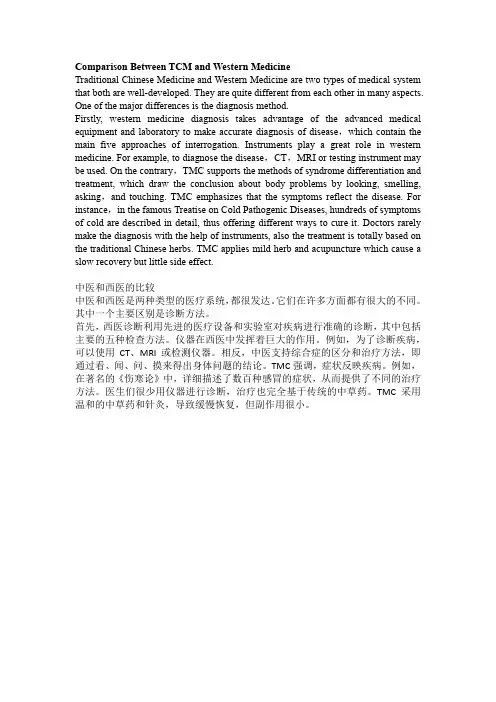
Comparison Between TCM and Western MedicineTraditional Chinese Medicine and Western Medicine are two types of medical system that both are well-developed. They are quite different from each other in many aspects. One of the major differences is the diagnosis method.Firstly, western medicine diagnosis takes advantage of the advanced medical equipment and laboratory to make accurate diagnosis of disease,which contain the main five approaches of interrogation. Instruments play a great role in western medicine. For example, to diagnose the disease,CT,MRI or testing instrument may be used. On the contrary,TMC supports the methods of syndrome differentiation and treatment, which draw the conclusion about body problems by looking, smelling, asking,and touching. TMC emphasizes that the symptoms reflect the disease. For instance,in the famous Treatise on Cold Pathogenic Diseases, hundreds of symptoms of cold are described in detail, thus offering different ways to cure it. Doctors rarely make the diagnosis with the help of instruments, also the treatment is totally based on the traditional Chinese herbs. TMC applies mild herb and acupuncture which cause a slow recovery but little side effect.中医和西医的比较中医和西医是两种类型的医疗系统,都很发达。
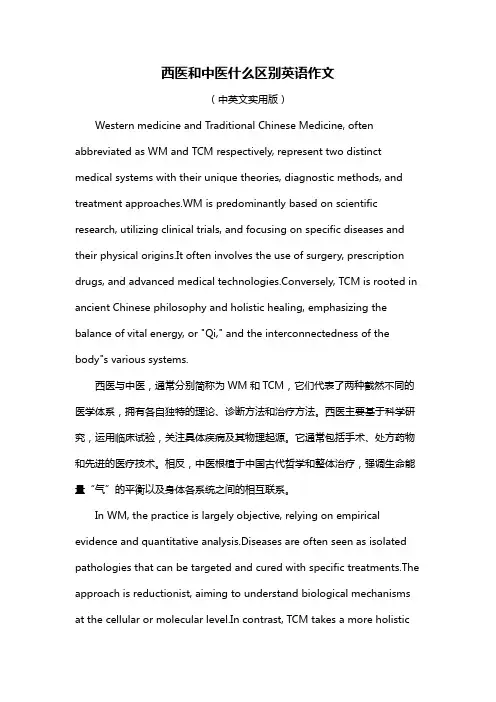
西医和中医什么区别英语作文(中英文实用版)Western medicine and Traditional Chinese Medicine, often abbreviated as WM and TCM respectively, represent two distinct medical systems with their unique theories, diagnostic methods, and treatment approaches.WM is predominantly based on scientific research, utilizing clinical trials, and focusing on specific diseases and their physical origins.It often involves the use of surgery, prescription drugs, and advanced medical technologies.Conversely, TCM is rooted in ancient Chinese philosophy and holistic healing, emphasizing the balance of vital energy, or "Qi," and the interconnectedness of the body"s various systems.西医与中医,通常分别简称为WM和TCM,它们代表了两种截然不同的医学体系,拥有各自独特的理论、诊断方法和治疗方法。
西医主要基于科学研究,运用临床试验,关注具体疾病及其物理起源。
它通常包括手术、处方药物和先进的医疗技术。
相反,中医根植于中国古代哲学和整体治疗,强调生命能量“气”的平衡以及身体各系统之间的相互联系。
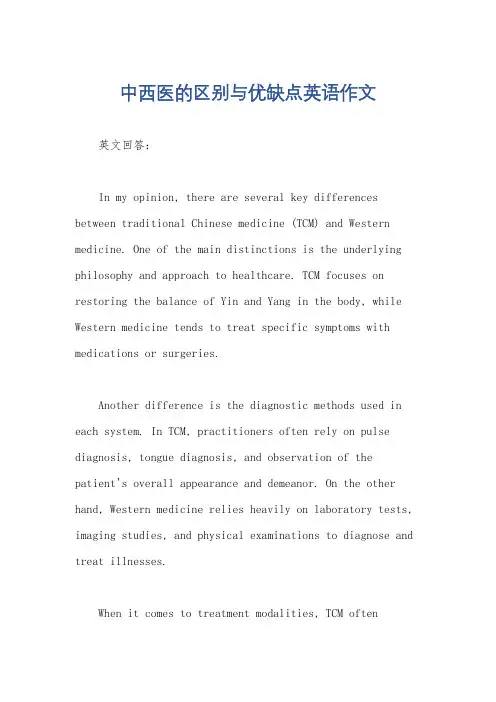
中西医的区别与优缺点英语作文英文回答:In my opinion, there are several key differences between traditional Chinese medicine (TCM) and Western medicine. One of the main distinctions is the underlying philosophy and approach to healthcare. TCM focuses on restoring the balance of Yin and Yang in the body, while Western medicine tends to treat specific symptoms with medications or surgeries.Another difference is the diagnostic methods used in each system. In TCM, practitioners often rely on pulse diagnosis, tongue diagnosis, and observation of thepatient's overall appearance and demeanor. On the other hand, Western medicine relies heavily on laboratory tests, imaging studies, and physical examinations to diagnose and treat illnesses.When it comes to treatment modalities, TCM oftenincludes acupuncture, herbal medicine, and dietary therapy, while Western medicine primarily uses pharmaceutical drugs and surgical interventions. Each approach has its own strengths and weaknesses.For example, one advantage of TCM is its focus on preventive care and holistic healing. By addressing the root cause of an illness and promoting overall well-being, TCM can help patients maintain good health and prevent future diseases. On the other hand, Western medicine excels in acute care and emergency situations, where immediate intervention is needed to save lives.However, one of the drawbacks of TCM is the lack of scientific evidence to support its effectiveness, which can make it difficult for some people to trust in its methods. In contrast, Western medicine is based on rigorousscientific research and clinical trials, which provide a solid foundation for its treatments.Overall, both TCM and Western medicine have their own strengths and weaknesses, and the best approach oftendepends on the individual's specific health needs and preferences.中文回答:在我看来,中西医之间存在几个关键区别。
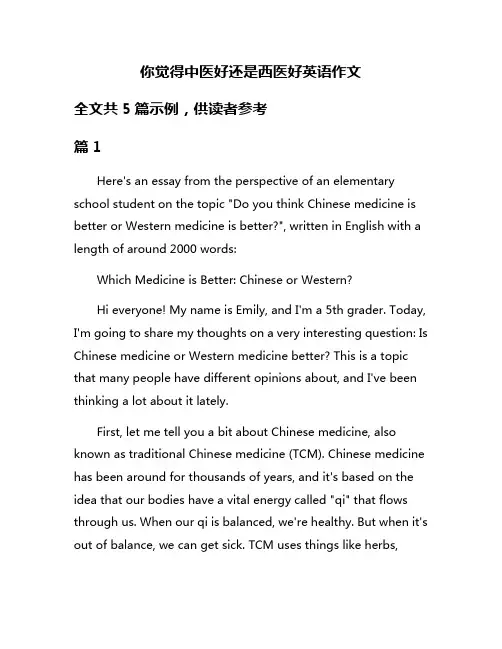
你觉得中医好还是西医好英语作文全文共5篇示例,供读者参考篇1Here's an essay from the perspective of an elementary school student on the topic "Do you think Chinese medicine is better or Western medicine is better?", written in English with a length of around 2000 words:Which Medicine is Better: Chinese or Western?Hi everyone! My name is Emily, and I'm a 5th grader. Today, I'm going to share my thoughts on a very interesting question: Is Chinese medicine or Western medicine better? This is a topic that many people have different opinions about, and I've been thinking a lot about it lately.First, let me tell you a bit about Chinese medicine, also known as traditional Chinese medicine (TCM). Chinese medicine has been around for thousands of years, and it's based on the idea that our bodies have a vital energy called "qi" that flows through us. When our qi is balanced, we're healthy. But when it's out of balance, we can get sick. TCM uses things like herbs,acupuncture (tiny needles inserted into specific points on the body), and massage to help restore the balance of qi.One of the things I really like about Chinese medicine is that it focuses on the whole person, not just the symptoms. For example, if you have a headache, a TCM practitioner might look at your diet, stress levels, and overall well-being to figure out what's causing the headache, instead of just giving you a pill to make the pain go away.Western medicine, on the other hand, is more focused on treating specific symptoms or diseases with things like medications, surgery, and radiation therapy. It's based on scientific research and relies a lot on technology and lab tests to diagnose and treat illnesses.One of the great things about Western medicine is that it can save lives in emergencies, like if someone has a heart attack or a serious injury. The advanced medical technologies and procedures they have are amazing! I'm really grateful that we have access to Western medicine when we need it.However, some people criticize Western medicine for being too focused on treating symptoms instead of underlying causes, and for sometimes causing side effects from the strong medications they use.So, which one is better? Well, in my opinion, both Chinese and Western medicine have their strengths and weaknesses. I think the best approach is to use a combination of both, depending on the situation.For example, if I have a minor cold or stomachache, I might try some herbal remedies or acupuncture first, since they're more gentle and natural. But if I had something really serious like appendicitis or a broken bone, I would definitely want to go to a Western doctor and get treated with modern medical procedures.I also think it's important to have a balanced lifestyle overall, with a healthy diet, regular exercise, and stress management. That can help prevent a lot of illnesses in the first place, whether you're using Chinese or Western medicine.Of course, it's always best to consult with qualified practitioners in both fields and to follow their advice. And if you have a serious condition, you should definitely see a Western doctor first.In conclusion, I think both Chinese and Western medicine have their own advantages and can work well together. It's great that we have access to different kinds of healthcare approaches,and we should use them wisely depending on our individual needs and situations.Well, those are my thoughts on this interesting topic! What do you guys think? Do you prefer Chinese medicine, Western medicine, or a combination of both? I'd love to hear your opinions too.篇2Is Traditional Chinese Medicine or Western Medicine Better?Hi, my name is Lily and I'm 10 years old. My teacher Mrs. Roberts asked us to write about whether we think traditional Chinese medicine or Western medicine is better. I've been thinking a lot about this since my grandma uses a lot of traditional Chinese herbs and my mom takes us to the regular doctor when we're sick.I think both traditional Chinese medicine and Western medicine can be good, but they are pretty different. Traditional Chinese medicine has been around for a really, really long time –over 2,000 years! It uses natural things like herbs, acupuncture with little needles, and exercises like tai chi. Western medicine is newer and uses more man-made medicines, surgery, and machines like X-rays.One good thing about traditional Chinese medicine is that the remedies come straight from nature. My grandma is always making us drink these weird teas made from roots, leaves, and other plants. They don't taste very good, but she says they'll help if we have a cough or stomach ache. Some of the herbs actually do seem to help me feel better when I'm sick. And since they're natural, they don't have too many side effects like some of the pills from the drugstore can have.Western medicine can also use natural ingredients in their medicines, but a lot of the drugs are totally made in laboratories by scientists. At first, I thought that was kind of scary – putting man-made chemicals into your body? But my dad explained that the medicines get tested a bunch to make sure they're safe before doctors can prescribe them. I guess that makes sense, but you never know if there could be side effects they haven't found yet.Another thing I like about traditional Chinese medicine is the idea of balance and energy flow. Grandma is always talking about yin and yang, and how you have to keep all the elements in your body balanced through herbs, acupuncture, and practices like meditation. In Western medicine, they don't reallytalk about that kind of energy stuff as much. It's more about treating specific symptoms or illnesses directly.On the other hand, Western medicine seems a lot more modern and scientific. Like when I broke my arm last year, the doctor took an X-ray right away to see exactly where the break was so they could put a cast on properly. Traditional Chinese medicine doesn't really have fancy machines like that. And I'm glad the doctor gave me pain medication to help with the hurt, instead of just drinking some herbal tea for it.Western treatments also seem to work faster for some things. Like when I have an ear infection, the antibiotic medicine usually makes me feel better in just a couple days. With my grandma's herbal soup, it feels like it takes way longer to get rid of stuff like that. But I guess traditional remedies are more about balance and taking time, compared to Western medicine's approach of attacking the problem directly.Surgeries are another big difference between the two. Western-trained doctors do all kinds of crazy operations to fix injuries or remove things like tumors. They have all these sharp tools and can even replace organs if something goes really wrong. The most traditional Chinese medicine does is acupuncture, which uses tiny little needles, but doesn't actuallyopen you up or take stuff out. I'm not sure how they would handle something major like open heart surgery.In terms of which type of medicine is better, I think they both do some things well, but also have weaknesses. Western medicine seems more powerful for setting broken bones, doing surgeries, and quickly treating infections or other sicknesses. But it has to use a lot of man-made drugs that could potentially cause side effects. Plus it doesn't really look at the whole-body balance and energy flow that traditional Chinese medicine focuses on.Traditional Chinese medicine is more natural and looks at keeping every part of your body in harmony through herbs, proper nutrition, and practices like acupuncture or tai chi. And it's been around way longer than Western medicine, so lots of people seem to think it works. But it also doesn't have high-tech tools for things like X-rays, surgeries, and setting broken bones. And the herbal remedies can take longer to make you feel better compared to fast-acting modern pills and treatments.Personally, I think I lean more towards preferring Western medicine overall. The doctors seem to have more advanced tools and treatments to directly handle injuries and sicknesses quickly. But I do respect the philosophy and natural approach behindtraditional Chinese medicine too. I think the ideal might be finding a way to combine the best parts of both systems somehow.Like, start with Western medicine's science and technology to diagnose problems and provide powerful treatments fast. But also include some of traditional Chinese medicine's herbs and remedies that don't have too many side effects. And focus on holistic healthcare that looks at your overall health and energy balance, not just treating a single symptom. Maybe do acupuncture or tai chi as well to keep everything aligned properly.That's just my opinion based on my experiences so far though. I know healthcare is really important, and there's still a lot for me to learn about these different medical approaches as I get older. I'm sure my views could totally change in the coming years too as science and research keeps advancing for both Western and traditional Chinese medicine. Those are just my thoughts for now based on what I've seen with my family. Let me know what you all think too! Thanks for reading my essay.篇3My Opinion on Traditional Chinese Medicine vs Western MedicineHave you ever wondered which is better, traditional Chinese medicine or Western medicine? I've thought a lot about this question. Let me tell you my thoughts!In my family, we've used both traditional Chinese medicine and Western medicine. My grandparents really believe in traditional Chinese medicine. Whenever I had a cough or fever as a little kid, my grandma would make me drink some yucky herbal soup. It smelled funny and tasted really bitter! She said it would help expel the sickness from my body.My grandpa is even more into traditional Chinese medicine. He does acupuncture and other treatments. Once when I had a stomach ache, he put these tiny needles all over my belly. It felt really weird but he said it would help the energy flow better in my body. Sometimes I think all these traditional practices are kind of strange and outdated. Isn't modern medicine more scientific and effective?On the other hand, my parents tend to take me to the hospital or clinic when I'm sick. The doctors there use Western medicine like pills, injections, and modern treatments. I really dislike getting shots because they pinch and sting! But I knowthey help fight viruses and infections. The medicines might make me feel yucky for a little while, but then I start feeling better quickly.In school, we learned about the history of traditional Chinese medicine. It's been around for thousands of years, even before Western science really developed. Ancient Chinese doctors studied human anatomy and developed complex theories about how the body works. They used herbs, minerals, massage, and even exercises as healing methods.I think it's pretty cool that the wisdom of traditional Chinese medicine has been passed down for so many centuries. My grandparents put a lot of faith in these time-honored practices that have helped billions of people. The remedies come from natural sources and they try to prevent illness, not just manage symptoms.However, Western medicine seems more advanced in many ways. It's based on rigorous scientific testing and high-tech tools. Doctors can do X-rays, MRI scans, and all sorts of lab tests to figure out what's wrong. They understand human biology and chemistry at a very deep level. The medications they use are precisely formulated and their effects carefully studied. You can'targue with the amazing treatments and cures that Western medicine has discovered.My favorite example is vaccines - how incredible is it that we can train our immune systems to fight diseases just by getting a few shots? Vaccines have saved countless lives and even eliminated deadly diseases like smallpox. Western doctors are always researching and developing better ways to heal people. That's really awesome progress!So in the battle between traditional Chinese medicine and Western medicine, I'm kind of stuck in the middle. There are good things about each approach. Maybe the best path is to combine the wisdom of ancient practices with the advancements of modern science? I've seen my doctor recommend dietary changes, exercise, and stress management alongside medications - which seems like a blend of both worlds.At the end of the day, I just want to be healthy and get better quickly whenever I'm sick or hurt. I'm glad we have so many options for healing! Perhaps traditional Chinese medicine and Western medicine can work side-by-side. As long as it's safe and effective, I'll give it a try - even if it tastes yucky or involves a few pinches. A kid's gotta do what a kid's gotta do to feel 100% again, right?篇4Do You Think Traditional Chinese Medicine or Western Medicine is Better?Hi everyone! My name is Lily and I'm in 5th grade. My teacher Mrs. Johnson asked us to write about whether we think traditional Chinese medicine or western medicine is better. This is a really tough question because both kinds of medicine can be good in different ways.Let me start by explaining what traditional Chinese medicine is. It's a type of medicine that has been practiced in China for thousands of years, way before western medicine even existed! Traditional Chinese medicine uses natural ingredients from plants and minerals to make remedies. The remedies can be things like herbal teas, powders, pills, and ointments.Some examples of traditional Chinese remedies are ginseng root to boost energy, chamomile tea to help you sleep, and ointments with ingredients like camphor or menthol to soothe muscle pain. Traditional Chinese doctors also do other treatments like acupuncture where they insert tiny needles into your skin, cupping where they use suction cups on your back,and reading your pulse to figure out if your body's energies are balanced.Western medicine is the kind of medicine we're probably more familiar with. It uses man-made drugs, surgery, radiation, and other high-tech treatments. Western medicine is what you get at the hospital and from your regular doctor. Things like antibiotics, chemotherapy, getting a cast for a broken bone, and getting an X-ray are all part of western medicine.So which type of medicine is better? In my opinion, both can be good depending on the situation! Here are some of the pros and cons of each:Pros of Traditional Chinese Medicine:Uses natural ingredients from plants and minerals instead of man-made drugsFocuses on balance and treating the whole body, not just the symptomsRemedies are usually cheaper than western medicine drugsFewer side effects since the ingredients are naturalHas been used for centuries so it has a long historyCons of Traditional Chinese Medicine:May not work as quickly as western medicine for serious diseasesRequires an expert to make the right remedy for your conditionSome remedies don't have much scientific evidenceCan interact with western medicine drugs in a bad wayPros of Western Medicine:Can treat urgent, life-threatening conditions quicklyUses high-tech equipment to get very accurate diagnosisBacked by lots of scientific testing and evidenceWorks faster for bacterial and viral infectionsEffective for traumatic injuries like broken bonesCons of Western Medicine:Man-made drugs can have harsh side effectsFocuses more on treating just the symptomsCan be very expensive, especially without insuranceSome overuse of antibiotics has made bacteria resistantIn my opinion, Western medicine is probably better for anything urgent like a heart attack, bad infection, or serious injury. The high-tech treatments and man-made drugs can work really fast to save your life. But for long-term conditions or just staying healthy, traditional Chinese medicine could be better. The natural remedies can help your body stay balanced without too many side effects.My grandma actually takes both! For her diabetes, she takes metformin which is a western medicine drug. But she also drinks bitter melon tea, which is a traditional Chinese remedy that can help control blood sugar naturally. For her arthritis pain, she sees an acupuncturist once a month and also takes a westernanti-inflammatory drug. By combining the two types of medicine, she gets the best of both worlds!Ultimately, I think the answer depends on the specific situation. Sometimes western medicine is better, but other times traditional Chinese remedies are just as good or even better, especially for chronic conditions. We're lucky that we have access to both options nowadays. If I was really sick, I would want my doctor to use whatever treatment gives me the best chance of getting better, whether it's from the east or the west!Those are just my thoughts as a 10-year-old kid, but I tried to look at the pros and cons of each type of medicine. Writing this essay helped me learn a lot about the differences between traditional Chinese medicine and western medicine. Even though I don't have all the answers, I think being open-minded to both traditions is important for having a balanced approach to health. Thanks for reading my essay! Let me know what you think about this topic.篇5Is Traditional Chinese Medicine or Western Medicine Better?Hi, my name is Emily and I'm in the 5th grade. For our writing assignment this week, we have to write an essay about whether we think traditional Chinese medicine or Western medicine is better. This is a really interesting topic that I've been thinking a lot about!Both traditional Chinese medicine and Western medicine try to help people get healthy and feel better when they are sick or hurt. But they go about it in pretty different ways. Western medicine is what we usually think of with doctors, nurses, hospitals, pills, and surgery. Traditional Chinese medicine usesmore natural remedies like herbs, acupuncture with needles, massage, and movements like tai chi.In my opinion, I think both kinds of medicine can be good in different situations. Sometimes Western medicine works really well, but other times traditional Chinese medicine might be better. Let me explain what I mean.When it comes to things like infections, broken bones, or emergencies where you need help fast, Western medicine is usually the way to go. If I had a bad cut or came down with strep throat, I would want antibiotics from a doctor to get rid of the bacteria causing the infection quickly. And if I was seriously injured or having a medical emergency, I'd need to go to a hospital for things like surgery, stitches, or other more intensive treatments.Western medicine is also really important for preventing diseases through things like vaccines. I got all my regular vaccination shots as a kid to keep me from getting measles, chickenpox and other illnesses that used to be a lot more common. Modern medicine has basically eliminated many diseases that used to be big problems. It has also developed treatments that can cure some cancers and manage conditionslike diabetes that were untreatable or even death sentences in the past.So in those kinds of serious, urgent situations, I would definitely put my trust in Western medical doctors, hospitals and treatments. The science behind modern Western medicine is tested very carefully to make sure it is safe and effective. We are really lucky to have access to that kind of advanced medical care.However, I think there are other situations where traditional Chinese medicine can be just as good, or even better than Western medicine approaches. Chinese medicine goes back thousands of years, so the remedies and treatments have been used and refined over a very long period of time. That's how we know they work well for many common, non-life-threatening conditions.For example, if I had a headache, muscle pain, or was just feeling a little run down, I might try drinking some herbal tea, getting an acupuncture treatment, or using other natural methods before taking a bunch of medication. While pills can sometimes get rid of those minor symptoms quickly, traditional remedies allow the body to heal itself without the side effects that drugs can sometimes cause. They are gentler but can be just as effective for more basic issues.Another situation where I might choose traditional Chinese medicine is for reducing stress or improving my overall wellbeing. Practices like tai chi, qigong, and meditation can be incredibly relaxing for the mind and body. Aromatherapy, massage, and drinking special herbal brews can also promote calmness and balance. Western medicine doesn't really have as many tools for those kinds of holistic health purposes.Of course, there are instances where people put too much faith in traditional remedies and ignore more serious medical issues that require immediate Western treatment. That can be really dangerous. So as good as Chinese medicine can be for certain problems, it shouldn't be used as a complete replacement for Western practices. It's best to combine the two systems in a balanced way.For example, if I got cancer, I would seek science-based surgery, chemotherapy, or radiation treatment from an oncologist right away. But I might also supplement that care with herbal supplements, acupuncture, and meditative practices to reduce side effects and improve my quality of life during treatment. Using the two kinds of medicine together can produce the best overall results.In fact, many hospitals now have integrated medical centers where both Western and traditional Chinese practices are used side-by-side. That's because medical professionals recognize the value in both approaches. Doctors want to give their patients access to every possible tool that could help them get and stay healthy.So in conclusion, I believe both traditional Chinese medicine and Western medicine have important roles to play. Each one is better suited for different situations or aspects of health and wellness. By intelligently combining the two, we can take advantage of the best components of each system to maximize our overall health and vitality. It's not an either/or situation, but a matter of using the right approach for the right circumstance.I hope this essay has helped explain some of the key differences between Chinese medicine and Western medicine, as well as when each one might be more appropriate to use. Writing this has definitely made me appreciate how lucky we are to have access to such a diversity of medical knowledge. With so many choices available, we have a great opportunity to learn what works best for each individual's situation. I know I still have a lot more to learn, but this assignment has gotten me really interested in the topic. I can't wait to read more about it!。
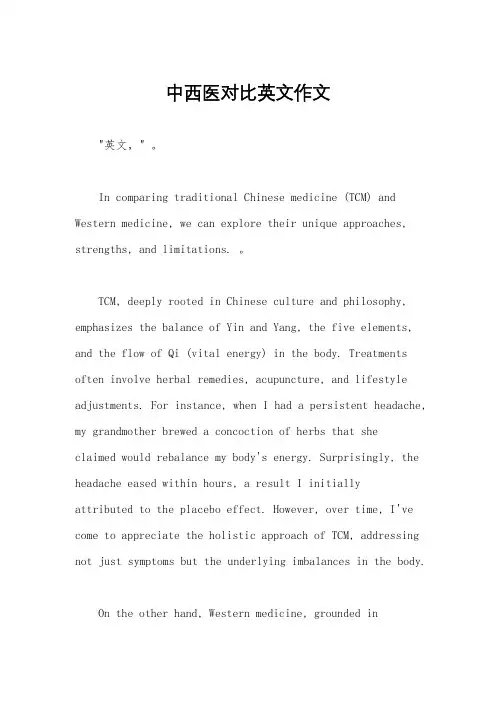
中西医对比英文作文"英文," 。
In comparing traditional Chinese medicine (TCM) and Western medicine, we can explore their unique approaches, strengths, and limitations. 。
TCM, deeply rooted in Chinese culture and philosophy, emphasizes the balance of Yin and Yang, the five elements, and the flow of Qi (vital energy) in the body. Treatments often involve herbal remedies, acupuncture, and lifestyle adjustments. For instance, when I had a persistent headache, my grandmother brewed a concoction of herbs that sheclaimed would rebalance my body's energy. Surprisingly, the headache eased within hours, a result I initiallyattributed to the placebo effect. However, over time, I've come to appreciate the holistic approach of TCM, addressing not just symptoms but the underlying imbalances in the body.On the other hand, Western medicine, grounded inscientific research and evidence-based practice, focuses on diagnosing and treating specific diseases. It reliesheavily on pharmaceutical drugs, surgery, and advanced medical technology. When I sprained my ankle playing basketball, I went to the hospital and received painkillers and physical therapy, which helped me recover relatively quickly. Western medicine's emphasis on rigorous testingand standardized treatments provides a sense of reassurance and confidence in its effectiveness."中文," 。
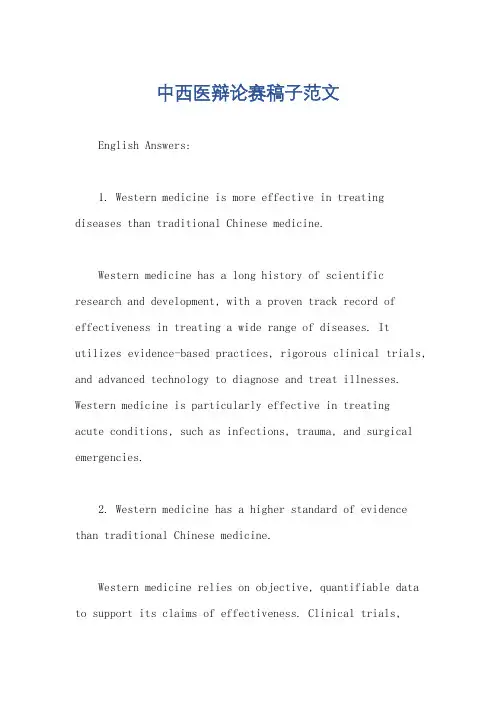
中西医辩论赛稿子范文English Answers:1. Western medicine is more effective in treating diseases than traditional Chinese medicine.Western medicine has a long history of scientific research and development, with a proven track record of effectiveness in treating a wide range of diseases. It utilizes evidence-based practices, rigorous clinical trials, and advanced technology to diagnose and treat illnesses. Western medicine is particularly effective in treatingacute conditions, such as infections, trauma, and surgical emergencies.2. Western medicine has a higher standard of evidence than traditional Chinese medicine.Western medicine relies on objective, quantifiable data to support its claims of effectiveness. Clinical trials,randomized controlled studies, and meta-analyses are used to evaluate the efficacy and safety of medical treatments. Traditional Chinese medicine, on the other hand, often lacks rigorous scientific evidence to support its claims.3. Western medicine is more accessible to patients than traditional Chinese medicine.Western medicine is widely available in most countries, with hospitals, clinics, and pharmacies located in both urban and rural areas. Traditional Chinese medicine, however, may not be as accessible, especially in Western countries.4. Western medicine is more compatible with modern science and technology.Western medicine embraces scientific principles and utilizes advanced technology, such as imaging techniques, laboratory tests, and surgical equipment. Traditional Chinese medicine, while rooted in ancient philosophy, may not always be fully compatible with modern scientificunderstanding.5. Western medicine is more transparent and accountable than traditional Chinese medicine.Western medicine is subject to strict regulations and oversight by government agencies to ensure patient safety and ethical practices. Traditional Chinese medicine, on the other hand, may lack the same level of transparency and accountability.中文回答:1. 西医治疗疾病比中医更有效。
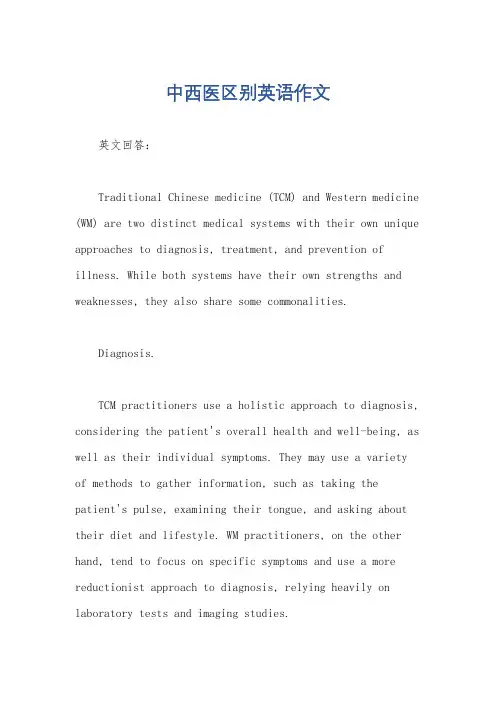
中西医区别英语作文英文回答:Traditional Chinese medicine (TCM) and Western medicine (WM) are two distinct medical systems with their own unique approaches to diagnosis, treatment, and prevention of illness. While both systems have their own strengths and weaknesses, they also share some commonalities.Diagnosis.TCM practitioners use a holistic approach to diagnosis, considering the patient's overall health and well-being, as well as their individual symptoms. They may use a variety of methods to gather information, such as taking thepatient's pulse, examining their tongue, and asking about their diet and lifestyle. WM practitioners, on the other hand, tend to focus on specific symptoms and use a more reductionist approach to diagnosis, relying heavily on laboratory tests and imaging studies.Treatment.TCM treatments typically involve the use of herbal remedies, acupuncture, and massage. TCM practitionersbelieve that these treatments help to restore balance tothe body and promote healing. WM treatments, on the other hand, typically involve the use of prescription drugs, surgery, and radiation therapy. WM practitioners believethat these treatments target specific diseases and symptoms.Prevention.TCM practitioners emphasize the importance of prevention, and they often recommend lifestyle changes,such as diet, exercise, and stress management, to help patients stay healthy. WM practitioners, on the other hand, tend to focus on early detection and treatment of disease, and they may recommend regular screenings and vaccinations.Strengths and Weaknesses.TCM is often seen as being more holistic and patient-centered than WM. TCM practitioners are more likely to take into account the patient's individual needs and preferences, and they may be more willing to consider alternative treatments. However, TCM can also be more difficult to understand and evaluate, and it may not be as effective for treating certain conditions as WM.WM is often seen as being more evidence-based and scientific than TCM. WM practitioners rely heavily on research to develop and evaluate their treatments, and they are more likely to use standardized protocols. However, WM can also be more expensive and invasive than TCM, and it may not be as effective for treating certain conditions as TCM.Conclusion.TCM and WM are two distinct medical systems with their own unique approaches to diagnosis, treatment, and prevention of illness. While both systems have their own strengths and weaknesses, they can be complementary, andmany patients benefit from using a combination of both systems.中文回答:中西医区别。
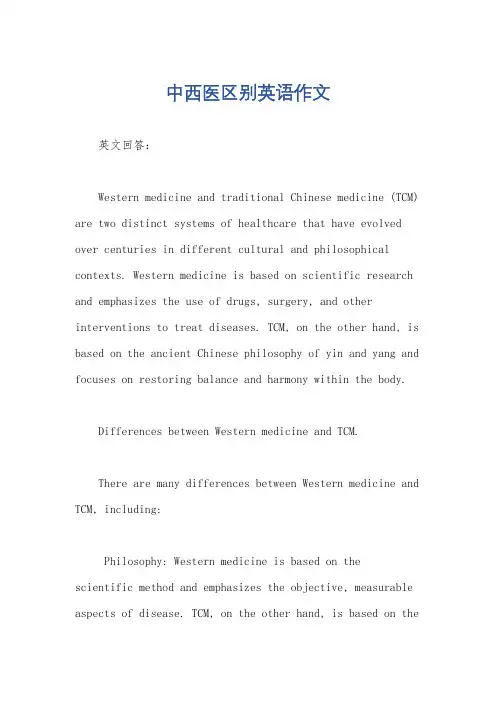
中西医区别英语作文英文回答:Western medicine and traditional Chinese medicine (TCM) are two distinct systems of healthcare that have evolved over centuries in different cultural and philosophical contexts. Western medicine is based on scientific research and emphasizes the use of drugs, surgery, and other interventions to treat diseases. TCM, on the other hand, is based on the ancient Chinese philosophy of yin and yang and focuses on restoring balance and harmony within the body.Differences between Western medicine and TCM.There are many differences between Western medicine and TCM, including:Philosophy: Western medicine is based on thescientific method and emphasizes the objective, measurable aspects of disease. TCM, on the other hand, is based on theancient Chinese philosophy of yin and yang and focuses onthe balance and harmony of the body.Treatment: Western medicine typically uses drugs, surgery, and other interventions to treat diseases. TCM, on the other hand, uses a variety of therapies, including acupuncture, herbal medicine, and massage, to restore balance and harmony to the body.Diagnosis: Western medicine typically uses laboratory tests and imaging to diagnose diseases. TCM, on the other hand, uses a variety of techniques, including pulse taking and tongue examination, to diagnose diseases.Prevention: Western medicine typically focuses on treating diseases after they have developed. TCM, on the other hand, also emphasizes prevention and encourages patients to make lifestyle changes to maintain their health.Similarities between Western medicine and TCM.Despite their differences, Western medicine and TCMshare some similarities, including:Goal: Both Western medicine and TCM aim to improve the health of patients.Patient care: Both Western medicine and TCM emphasize the importance of patient care and providing individualized treatment plans.Research: Both Western medicine and TCM are engaged in research to improve their understanding of diseases and develop new treatments.Conclusion.Western medicine and TCM are two distinct systems of healthcare that have different philosophies, treatments, and diagnostic techniques. However, both systems share the goal of improving the health of patients and providing individualized care.中文回答:中医和西医的区别。
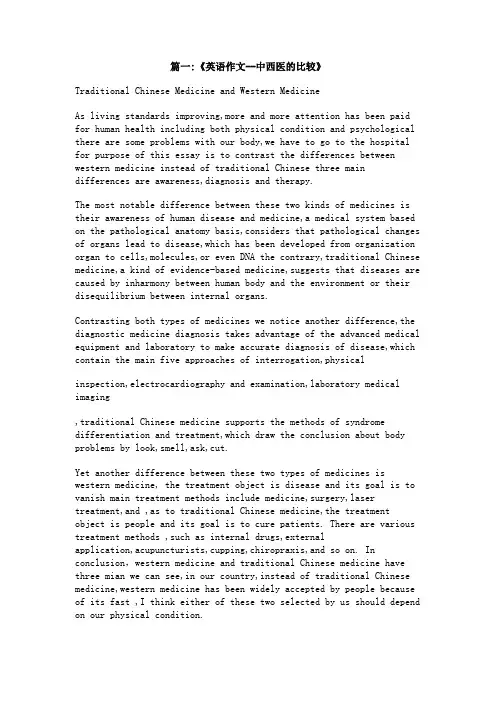
篇一:《英语作文--中西医的比较》Traditional Chinese Medicine and Western MedicineAs living standards improving,more and more attention has been paid for human health including both physical condition and psychological there are some problems with our body,we have to go to the hospital for purpose of this essay is to contrast the differences between western medicine instead of traditional Chinese three main differences are awareness,diagnosis and therapy.The most notable difference between these two kinds of medicines is their awareness of human disease and medicine,a medical system based on the pathological anatomy basis,considers that pathological changes of organs lead to disease,which has been developed from organization organ to cells,molecules,or even DNA the contrary,traditional Chinese medicine,a kind of evidence-based medicine,suggests that diseases are caused by inharmony between human body and the environment or their disequilibrium between internal organs.Contrasting both types of medicines we notice another difference,the diagnostic medicine diagnosis takes advantage of the advanced medical equipment and laboratory to make accurate diagnosis of disease,which contain the main five approaches of interrogation,physicalinspection,electrocardiography and examination,laboratory medical imaging,traditional Chinese medicine supports the methods of syndrome differentiation and treatment,which draw the conclusion about body problems by look,smell,ask,cut.Yet another difference between these two types of medicines is western medicine, the treatment object is disease and its goal is to vanish main treatment methods include medicine,surgery,laser treatment,and ,as to traditional Chinese medicine,the treatment object is people and its goal is to cure patients. There are various treatment methods ,such as internal drugs,externalapplication,acupuncturists,cupping,chiropraxis,and so on. In conclusion,western medicine and traditional Chinese medicine have three mian we can see,in our country,instead of traditional Chinese medicine,western medicine has been widely accepted by people because of its fast ,I think either of these two selected by us should depend on our physical condition.篇二:《传统中药与西药对比的英文论文》What is the major difference betweentraditional Chinese medicine andWestern medicine?【Abstract】 Because of the globalization, the comparison between traditional Chinese medicine(TCM) and western medicine have been attracted far more attentions than before. As one of the aspects of intercultural communication, this paper focuses on two major points, the different two concepts, the treatments or their prescriptions. They will be given a brief introduction in this paper so that after reading this paper people in different cultural backgrounds will know more about the difference between traditional Chinese medicine and Western medicine and be more convenient to communicate.【Key words】Concepts Treatments Prescriptions Attitudes Communication Different cultural backgrounds1. Differences between Two ConceptsFrom this table, we may get some explanations of why are traditional Chinese and westerners so different to treat disease.The Concepts of Traditional Chinese MedicineIn general, disease is perceived as a disharmony (or imbalance) in the functions or interactions of yin, yang, qi, xuĕ, zàng-fǔ, meridians etc, or of the interaction between the human body and the environment.[1]Therapy is based on which "pattern of disharmony" can be identified. Thus,"pattern discrimination" is the most important step in TCM diagnosis. It is also known to be the most difficult aspect of practicing TCM. In order to determine which pattern is at hand, practitioners will examine things like the color and shape of the tongue, the relative strength of pulse-points, the smell of the breath, the quality of breathing or the sound of the voice. [2] For example, depending on tongue and pulse conditions, a TCM practitioner might diagnose bleeding from the mouth and nose as: "Liver fire rushes upwards and scorches the Lung, injuring the blood vessels and giving rise toreckless pouring of blood from the mouth and nose."[3] He might then go on to prescribe treatments designed to clear heat or supplement the lung.The Concepts of Western MedicineIn western medicine, the clinical practice is thought highly of. Doctors personally assess patients in order to diagnose, treat, and prevent disease using clinical judgment.The doctor-patient relationship typically begins an interaction with an examination of the patient's medical history and medical record, followed a medical interview[4] and a physical examination. Basic diagnostic medical devices ( stethoscope, tongue depressor) are typically used. After examination for signs and interviewing for symptoms, the doctor may order medical tests ( blood tests), take a biopsy, or prescribe pharmaceutical drugs or other therapies. Differential diagnosis methods help to rule out conditions based on the information provided. During the encounter, properly informing the patient of all relevant facts is an important part of the relationship and the development of trust. The medical encounter is then documented in the medical record, which is a legal document in many jurisdictions.[5]2. Therapies of Traditional Chinese and Western MedicineReferring to these concepts, I will put my emphases on two primary roots as follows, which have comparatively reflected two different therapies.Therapy of Traditional ChineseThe traditional Chinese medicine thought most diseases are aroused by “SixExcesses”(六淫, pinyin: liù yín, sometimes also translated as "Pathogenic Factors", or "Six Pernicious Influences"; with the alternative term of 六邪, pinyin: liù xié, - "Six Evils" or "Six Devils") are allegorical terms used to describe disharmony patterns displaying certain typical symptoms.[6] These symptoms resemble the effects of six climatic factors. In the allegory, these symptoms can occur because one or more ofthose climatic factors (called 六气, pinyin: liù qì, "the six qi") were able to invade the body surface and to proceed to the interior.This is sometimes used to draw causal relationships (, prior exposure to wind/cold/etc. is identified as the cause of adisease), while other authors explicitly deny a direct cause-effect relationship between weather conditions and disease, pointing outthat the Six Excesses are primarily descriptions of a certain combination of symptoms translated into a pattern ofdisharmony.[7]It is undisputed, though, that the Six Excesses can manifest inside the body without an external cause. In this case, they might be denoted "internal", ,"internal wind" or "internal fire (or heat)".The Six Excesses and their characteristic clinical signs are:{中药和西药对比英语作文}.1. Wind (风, pinyin: fēng): Rapid onset of symptoms, wandering location ofsymptoms, itching, nasal congestion, "floating" pulse; tremor, paralysis,convulsion.2. Cold (寒, pinyin: hàn): Cold sensations, aversion to cold, relief of symptomsby warmth, watery/clear excreta, severe pain, abdominal pain,3.4.{中药和西药对比英语作文}.5.6. contracture/hypertonicity of muscles, (slimy) white tongue fur, "deep"/"hidden" or "string-like" pulse, or slow pulse. Fire/Heat (火, pinyin: huǒ): Aversion to heat, high fever, thirst, concentrated urine, red face, red tongue, yellow tongue fur, rapid pulse. (Fire and heat are basically seen to be the same) Dampness (湿, pinyin:shī): Sensation of heaviness, sensation of fullness, symptoms of Spleen dysfunction, greasy tongue fur, "slippery" pulse. Dryness (燥, pinyin: zaò): Dry cough, dry mouth, dry throat, dry lips, nosebleeds,dry skin, dry stools. Summerheat (暑, pinyin: shǔ): Either heat or mixed damp-heat symptoms.According these six excesses, Chinese not only have herbals to treat these diseases, but also have practical treatments, such as acupuncture and moxibustion, Tui na, and Qigong. And also they have cupping(拔罐), GuaSha, and Die-da. Acupuncture means insertion of needles into superficial structures of the body (skin, subcutaneous tissue, muscles) - usually at acupuncture points (acupoints) - and their subsequentmanipulation; this aims at influencing the flow of qi.[8] Accordingto TCM it relieves pain and treats (and prevents) various diseases.[9]Acupuncture is often accompanied by moxibustion - the Chinese characters for acupuncture Chinese: 针灸; pinyin: zhēnjiǔ literally meaning{中药和西药对比英语作文}."acupuncture-moxibustion" - which involves burning mugwort on or near the skin at an acupuncture point. There are three methods of moxibustion: Direct scarring, direct non-scarring, and indirect moxibustion. Direct scarring moxibustion places a small cone of mugwort on the skin at an acupuncture point and burns it until theskin{中药和西药对比英语作文}.blisters, which then scars after it heals. Direct non-scarring moxibustion removes the burning mugwort before the skin burns enoughto scar, unless the burning mugwort is left on the skin too long. Indirect moxibustion holds a cigar made of mugwort near the acupuncture point to heat the skin, or holds it on an acupuncture needle inserted in the skin to heat the needle.[10]In electroacupuncture, an electrical current is applied to theneedles once they are inserted, in order to further stimulate the respective acupuncture points.Tui na (推拿) is a form of massage akin to acupressure (from which shiatsuevolved). Oriental massage is typically administered with the patient fully clothed, without the application of grease or oils. Choreography often involves thumb presses, rubbing, percussion, and stretches.Qigong (气功 or 氣功) is coordinated breathing, movement, and awareness used for exercise, healing, and mediation. Traditional Chinese medicine practioners believe that qìgōng (气功/氣功) and related practices prevent, heal, and treat diseases.{中药和西药对比英语作文}.The Prescriptions of TCMRaw materialsThere are roughly 13,000 medicines used in China and over 100,000 medicinal recipes recorded in the ancient literature. Plant elements and extracts are by far themost common elements used. n the classic Handbook of Traditional Drugs from 1941, 517 drugs were listed - out of these, 45 were animal parts, and 30 were minerals. Animal substances{中药和西药对比英语作文}.Some animal parts used as medicines can be considered rather strange such as cows' gallstones. Some can include the parts of endangered species, including tiger penis and rhinoceros horn. The black market in rhinoceros horn reduced the world's rhino population by more than 90 percent over the past 40 years. Concerns have also arisen over the use of turtle plastron and seahorses. In general, Chinese traditional medicine emphasizes the penis of animals as therapeutic. Snake oil, which is used traditionally for joint pain as a liniment, is the most widely known Chinese medicine in the west, due to extensive marketing in the west in the late 1800s and early 1900s, and wild claims of its efficacy to treat many maladies; however, there is no clinical evidence that it is effective. Since TCM recognizes bear bile as a medicinal, more than 12,000 asiatic black bears are held in "bear farms", where they suffer cruel conditions while being held in tiny cages. The bile is extracted through a permanent hole in theabdomen leading to the gall bladder, which can cause severe pain; the bears are known to regularly try to kill themselves.Human body partsTraditional Chinese Medicine also includes some human parts: the classic Materia medica (Bencao Gangmu) describes the use of 35 human body parts and excreta inmedicines, including bones, fingernail, hairs, dandruff, earwax, impurities on the teeth, feces, urine, sweat, organs, but most are no longer in use.[11] [12]Therapy of Western MedicineWithin medical circles, specialities usually fit into one of two broad categories: "Medicine" and "Surgery." "Medicine" refers to the practice of non-operativemedicine, and most subspecialties in this area require preliminary training in "Internal Medicine". In the UK, this would traditionally have been evidenced by obtaining the MRCP (An exam allowing Membership of the Royal College of Physicians or theequivalent college in Scotland or Ireland). "Surgery" refers to the practice of operative medicine, and most subspecialties in this area require preliminary training in "General Surgery." (In the UK: Membership of the Royal College of Surgeons of England (MRCS).)During the medical care, the provision of it is classified into primary, secondary, and tertiary care categories. Primary medical services are provided by physicians, physician assistants, nurse practitioners, or other health professionals who have first contact with a patient seeking medical treatment or care. These occur in physicianoffices, clinics, nursing homes, schools, home visits, and other places close to patients. About 90% of medical visits can be treated by the primary care provider. Theseinclude treatment of acute and chronic illnesses, preventive care and health education for all ages and both sexes. Secondary medical services are provided by medical specialists in their offices or clinics or at local community hospitals for a patient referred by a primary care provider who first diagnosed or treated the patient.Referrals are made for those patients who required the expertise or proceduresperformed by specialists. These include both ambulatory care and inpatient services, emergency rooms, intensive care medicine, surgery services, physical therapy, labor and delivery, endoscopy units, diagnostic laboratory and medical imaging services, hospice centers, etc. Some primary care providers may also take care of hospitalizedpatients and deliver babies in a secondary care setting. Tertiary medical services are provided by specialist hospitals or regional centers equipped with diagnostic and treatment facilities not generally available at local hospitals. These include traumacenters, burn treatment centers, advanced neonatology unit services, organ transplants, high-risk pregnancy, radiation oncology, medical care also depends on information - still delivered in many health care settings on paper records, butincreasingly nowadays by electronic means. At the end of the treatment, doctors always give patients some pills which should been had regularly.The Prescriptions of Western MedicineA medication or medicine is a drug taken to cure and ameliorate any symptoms of an illness or medical condition, or may be used as preventive medicine that has future benefits but does not treat any existing or pre-existing diseases or symptoms.Dispensing of medication is often regulated by governments into threecategories—over-the-counter (OTC) medications, which are availablein pharmacies and supermarkets without special restrictions, behind-the-counter (BTC), which are dispensed by a pharmacist without needing a doctor's prescription, and Prescription only medicines (POM), which must be prescribed by a licensed medical professional, usually a physician.[citation needed]篇三:《中西药对比》西药、中成药、新型中药产品对比篇四:《中药与西药》论文作业题目:面临西药,中药的优势及不足系别:药学院专业:中药学学生姓名:张正兴学号:512050801410目录:绪论一、西药和中药的了解及概念二、中西药研发三、中药西药合理配伍四、中药现状及需要注意问题五、天然药六、中药的优势七、例举中药患者极其医治情况面临西药,中药的优势及不足绪论:近些年来,国内外的医药学工作者,对中药给予了更多的重视。
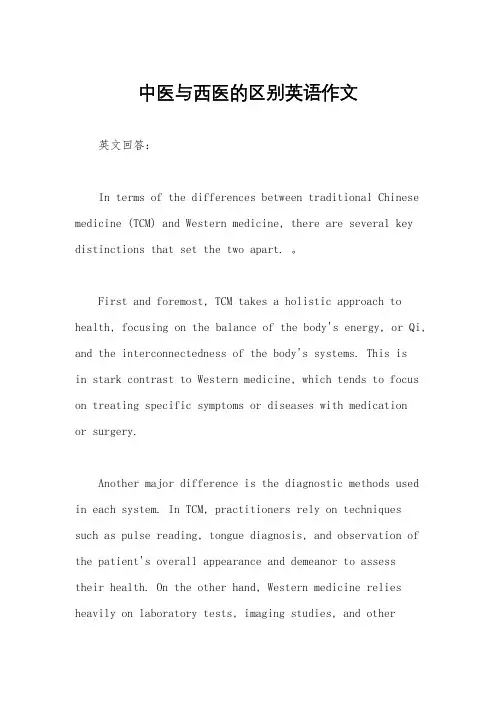
中医与西医的区别英语作文英文回答:In terms of the differences between traditional Chinese medicine (TCM) and Western medicine, there are several key distinctions that set the two apart. 。
First and foremost, TCM takes a holistic approach to health, focusing on the balance of the body's energy, or Qi, and the interconnectedness of the body's systems. This isin stark contrast to Western medicine, which tends to focus on treating specific symptoms or diseases with medicationor surgery.Another major difference is the diagnostic methods used in each system. In TCM, practitioners rely on techniques such as pulse reading, tongue diagnosis, and observation of the patient's overall appearance and demeanor to assesstheir health. On the other hand, Western medicine relies heavily on laboratory tests, imaging studies, and otherscientific methods to diagnose and treat illnesses.Furthermore, the treatments themselves differ significantly between the two systems. TCM often utilizes techniques such as acupuncture, herbal medicine, anddietary therapy to restore balance and promote healing. In contrast, Western medicine primarily relies on pharmaceutical drugs, surgery, and other invasive procedures to address health issues.It's also worth noting that the philosophical foundations of TCM and Western medicine are quite different. TCM is rooted in the ancient Chinese philosophy of Taoism, which emphasizes harmony with nature and the interconnectedness of all things. Western medicine, on the other hand, is based on the principles of empirical science and the idea of controlling and manipulating the body's functions to achieve desired outcomes.In conclusion, while both TCM and Western medicine aimto promote health and well-being, they do so through vastly different approaches and philosophies.中文回答:中医和西医之间的区别有几个关键的不同之处。
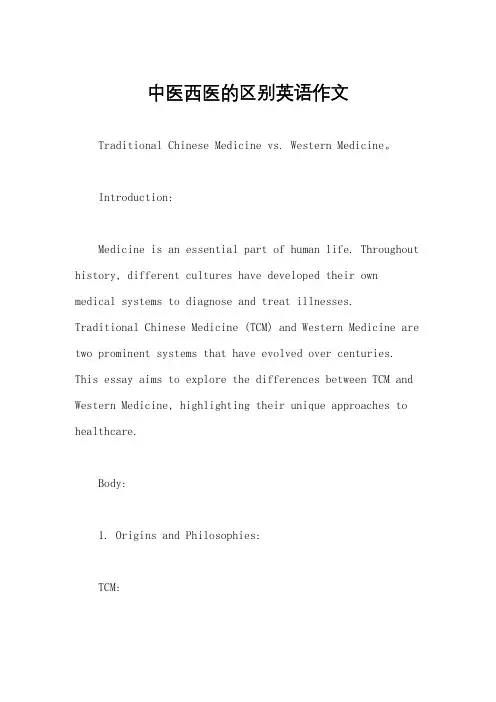
中医西医的区别英语作文Traditional Chinese Medicine vs. Western Medicine。
Introduction:Medicine is an essential part of human life. Throughout history, different cultures have developed their own medical systems to diagnose and treat illnesses.Traditional Chinese Medicine (TCM) and Western Medicine are two prominent systems that have evolved over centuries. This essay aims to explore the differences between TCM and Western Medicine, highlighting their unique approaches to healthcare.Body:1. Origins and Philosophies:TCM:Originated in ancient China over 2,500 years ago.Based on the philosophies of Yin and Yang, Five Elements, and Qi.Emphasizes the balance and harmony of the body, mind, and spirit.Focuses on the prevention of diseases and maintaining overall well-being.Western Medicine:Originated in ancient Greece and Rome, with significant contributions from the Middle East.Based on the scientific method, anatomy, physiology, and biochemistry.Emphasizes evidence-based practices and the use of pharmaceuticals.Focuses on diagnosing and treating specific diseases.2. Diagnostic Methods:TCM:Diagnosis is based on observing the patient's appearance, tongue, pulse, and asking detailed questions about symptoms and medical history.Emphasizes the holistic assessment of the patient's overall health.TCM practitioners use techniques like tongue diagnosis, pulse diagnosis, and palpation to identify imbalances in the body's energy flow.Western Medicine:Diagnosis is based on laboratory tests, physical examinations, and medical imaging.Emphasizes the identification of specific diseases and their causes.Western medical practitioners rely on advanced technology and scientific evidence to diagnose illnesses accurately.3. Treatment Approaches:TCM:Treatment involves a combination of herbal medicine, acupuncture, dietary therapy, and exercises like Tai Chi and Qigong.TCM aims to restore the balance of Yin and Yang, promoting the body's natural healing abilities.Treatment plans are personalized according to the individual's constitution and specific symptoms.Western Medicine:Treatment primarily involves pharmaceutical drugs, surgery, and other invasive procedures.Western medicine focuses on eliminating symptoms and curing diseases.Treatment plans are standardized based on scientific research and clinical trials.4. Views on Health and Disease:TCM:Considers health as a state of balance between Yin and Yang energies.Disease is seen as an imbalance or blockage of Qi (energy) flow.TCM aims to restore balance and harmony to prevent and treat diseases.Western Medicine:Views health as the absence of disease.Diseases are caused by pathogens, genetic factors, or lifestyle choices.Western medicine focuses on diagnosing and treating diseases to restore health.Conclusion:Both Traditional Chinese Medicine and Western Medicine have their own unique approaches to healthcare. TCM focuses on holistic well-being, prevention, and restoring balance, while Western Medicine emphasizes scientific research, disease-specific treatments, and symptom management. In recent years, there has been a growing interest in integrating these two medical systems to provide comprehensive and personalized healthcare to patients. Understanding the differences between TCM and WesternMedicine can help individuals make informed decisions about their healthcare choices.。
中药和西药对比英语作文English:Traditional Chinese medicine (TCM) and Western medicine differ in their approaches to healthcare. TCM, rooted in ancient Chinese philosophy and practices, focuses on restoring balance and harmony within the body through the use of natural substances such as herbs, acupuncture, and qi gong. It emphasizes a holistic view of health, treating not only the symptoms but also addressing the underlying causes of illness. On the other hand, Western medicine is grounded in scientific principles and relies heavily on pharmaceutical drugs, surgery, and advanced medical technology for diagnosis and treatment. It tends to target specific symptoms or diseases rather than considering the body as a whole. While TCM often takes a gradual and preventive approach to health maintenance, Western medicine generally offers more immediate and symptomatic relief. Despite their differences, both systems have their strengths and weaknesses. TCM's personalized and holistic approach may be more suitable for chronic conditions or promoting overall well-being, while Western medicine's rigorous scientific methods excel in acute and emergency care situations. Integrating both approaches, known ascomplementary and alternative medicine (CAM), has gained popularity in recent years, offering patients a more comprehensive and balanced approach to healthcare.Translated content:中药和西药在医疗方法上有所不同。
中医英语作文中西医的差异带翻译范文和西药相比,中药有它自身的优势,也永远不会被淘汰,今天在这里为大家介绍中医英语作文中西医的差异,欢迎大家阅读!In the past decades,there have bee n repeated discussi onsto give up Chin ese medic in e,it now has become a hot topic.Advocators believed that Chinese medicine is notscie ntifically based in comparis on with West medic in e.Though it's still debateable whether Chin ese medic ine is scie ntifically sound,no one can deny that it has rich philosophically conten t..From this perspective,Ch in ese medici ne is totally differe nt from western medici ne.据说,最近几十年,出现过多次要求取消中医的呼吁,最近还闹得厉害。
倡导者认为:与西医相比,中医没有科学依据。
中医是不是科学有待论证,但中医有着深厚的哲学内涵却毋庸置疑。
从这点上说,中西医迥然不同。
A Chinese medicine doctor treats illness by the way of generalization,emphsis entirety and dialectical treatment,sosome people view it as holistic medic in e.A western medici ne doctor treats ill ness by the symptoms.For example,if you have a sore throat,the western medicine doctor considers it as athroat problem,while a Chi nese medici ne doctor may link it toyour stomach trouble.中医通常从宏观角度认识问题,强调整体性和辨证施治,有人称其为整体医学。
西医和中医什么区别英语作文Western medicine and traditional Chinese medicine are two different approaches to healthcare. 西医和中医是两种截然不同的医疗方法。
Western medicine is based on scientific evidence and is heavily focused on the diagnosis and treatment of diseases using pharmaceuticals and surgery. 而西医基于科学证据,主要侧重于使用药物和手术诊断和治疗疾病。
Traditional Chinese medicine, on the other hand, takes a holistic approach and views the body as a whole system, focusing on maintaining balance and harmony to prevent and treat illnesses. 而中医则采取整体观念,将身体视为一个整体系统,着重于保持平衡和和谐以预防和治疗疾病。
One of the key differences between Western medicine and traditional Chinese medicine is their understanding of the human body and the causes of illness. 西医和中医之间的关键区别之一是对人体及疾病起因的理解。
Western medicine generally views the body as a mechanical system, with illnesses being caused by specific pathogens or dysfunctions in the body's organs or tissues. 西医一般将人体视为一个机械系统,疾病是由特定病原体或器官或组织功能失调引起的。
中药西药对比英文作文英文:When it comes to comparing traditional Chinese medicine (TCM) and Western medicine, there are several key differences to consider.Firstly, TCM is based on a holistic approach to health, taking into account the individual's physical, emotional, and spiritual well-being. Western medicine, on the other hand, tends to focus more on treating specific symptoms or diseases.Secondly, TCM uses natural remedies, such as herbs, acupuncture, and massage, to promote healing and balance in the body. Western medicine, on the other hand, relies heavily on pharmaceutical drugs and surgery.Finally, TCM emphasizes prevention and maintenance of health, while Western medicine tends to focus more ontreating illnesses after they have already occurred.Overall, both TCM and Western medicine have their strengths and weaknesses. It's important to consider the individual's specific health needs and preferences when deciding which approach to take.中文:谈到比较中药和西药,有几个关键的区别需要考虑。
中药和西药对比英语作文Traditional Chinese Medicine vs. Western Medicine: A Comparative Analysis.Throughout history, humans have relied on various systems of medicine to alleviate ailments and maintain health. Two prominent systems that have coexisted for centuries are Traditional Chinese Medicine (TCM) and Western Medicine (WM). This essay aims to present a comprehensive comparison between these two distinct approaches to healthcare, highlighting their key differences, similarities, and potential synergies.Origins and Philosophical Foundations.TCM originated in ancient China and is based on a holistic philosophy that views the human body as an interconnected system of energies, channels (meridians), and organs. It emphasizes the importance of balance and harmony within the body and seeks to restore health byaddressing the root causes of disease rather than just treating symptoms.WM, on the other hand, has its roots in ancient Greece and relies heavily on scientific methods and evidence-based practices. It primarily focuses on the physical body andits components, viewing diseases as localized conditions that can be treated through specific interventions.Diagnostic Methods.TCM employs a comprehensive diagnostic approach that involves observing a patient's physical appearance, listening to their pulse and breathing, and asking detailed questions about their symptoms, lifestyle, and medical history. This holistic assessment aims to identify patterns of disharmony within the body and determine the underlying imbalances that may be contributing to illness.WM typically relies on physical examinations, laboratory tests, and imaging techniques to diagnose diseases. These methods provide objective data aboutspecific bodily structures and functions, enabling medical professionals to pinpoint the location and nature ofmedical conditions.Treatment Approaches.The treatment strategies in TCM and WM differ significantly. TCM utilizes a wide range of modalities, including herbal remedies, acupuncture, massage (tui na), and qigong exercises. Herbal remedies are composed of various plant or animal substances believed to have therapeutic properties that can restore balance within the body. Acupuncture involves inserting thin needles into specific points on the skin along the meridians tostimulate the flow of qi (vital energy) and promote healing.WM employs a vast array of pharmaceuticals, surgical interventions, and physical therapies. Pharmaceuticals are chemically synthesized or extracted from natural sourcesand are used to target specific diseases or symptoms. Surgical interventions are performed to remove or repair damaged tissues or restore normal function. Physicaltherapies focus on improving mobility, reducing pain, and facilitating recovery from injuries or illnesses.Similarities and Convergence.Despite their fundamental differences, TCM and WM share some commonalities. Both systems acknowledge the importance of a healthy lifestyle, including a balanced diet and regular exercise. Both aim to alleviate suffering, restore health, and promote well-being.In recent years, there has been a growing interest in integrating TCM and WM. Integrative medicine approaches seek to combine the best of both worlds by utilizing evidence-based practices from WM along with complementary therapies from TCM. This convergence has led to promising results in treating complex health conditions, particularly those that do not respond well to conventional therapies alone.Strengths and Weaknesses.TCM excels in treating chronic conditions, maintaining overall health, and addressing emotional well-being. It offers a personalized approach that takes into account the individual's unique constitution and lifestyle. However, TCM is not always supported by rigorous scientific evidence, and the efficacy of some of its practices remains controversial.WM is highly effective in treating acute conditions, infectious diseases, and traumatic injuries. It provides standardized protocols and precise diagnostic tools. However, WM may be limited in addressing the underlying causes of chronic diseases and may sometimes rely heavilyon symptom suppression rather than addressing the root of the problem.Conclusion.Traditional Chinese Medicine and Western Medicine represent two distinct approaches to healthcare with unique strengths and limitations. TCM emphasizes a holistic,patient-centered approach, while WM focuses on evidence-based practices and treating specific medical conditions. Both systems offer valuable contributions to healthcare, and their convergence has the potential to enhance our ability to prevent and treat a wide range of health issues. By understanding the differences and similarities between TCM and WM, we can make informed decisions about our healthcare choices and strive for a more comprehensive and holistic approach to health and well-being.。
中医西医比较考研英语二作文English:Both traditional Chinese medicine (TCM) and Western medicine have their own strengths and weaknesses. TCM focuses on balancing the body's energy flow and using natural remedies like herbs and acupuncture to treat illnesses holistically, while Western medicine relies on scientific evidence and technological advancements to diagnose and treat diseases. TCM takes into consideration the whole body and treats the root cause of the illness, while Western medicine often targets specific symptoms with pharmaceutical drugs or surgical procedures. Both systems have their own merits and can complement each other in providing comprehensive healthcare for patients. It is important for healthcare professionals to have an open mind and be willing to integrate both TCM and Western medicine practices to offer the best possible care for patients.中文翻译:传统中医和西医各有优势和劣势。
Traditional Chinese Medicine and Western Medicine
As living standards improving,more and more attention has been paid for human health including both physical condition and psychological status.When there are some problems with our body,we have to go to the hospital for help.The purpose of this essay is to contrast the differences between western medicine instead of traditional Chinese medicine.The three main differences are awareness,diagnosis and therapy.
The most notable difference between these two kinds of medicines is their awareness of human disease and health.Western medicine,a medical system based on the pathological anatomy basis,considers that pathological changes of organs lead to disease,which has been developed from organization organ to cells,molecules,or even DNA level.On the contrary,traditional Chinese medicine,a kind of evidence-based medicine,suggests that diseases are caused by inharmony between human body and the environment or their disequilibrium between internal organs.
Contrasting both types of medicines we notice another difference,the diagnostic method.western medicine diagnosis takes advantage of the advanced medical equipment and laboratory to make accurate diagnosis of disease,which contain the main five approaches of interrogation,physical examination,laboratory inspection,electrocardiography and medical imaging
examination.Whereas,traditional Chinese medicine supports the methods of syndrome differentiation and treatment,which draw the conclusion about body problems by look,smell,ask,cut.
Yet another difference between these two types of medicines is therapies.As western medicine, the treatment object is disease and its goal is to vanish disease.The main treatment methods include medicine,surgery,laser treatment,and chemotherapy.Nevertheless,as to traditional Chinese medicine,the treatment object is people and its goal is to cure patients. There are various treatment methods ,such as internal drugs,external application,acupuncturists,cupping,chiropraxis,and so on. In conclusion,western medicine and traditional Chinese medicine have three mian differences.As we can see,in our country,instead of traditional Chinese medicine,western medicine has been widely accepted by people because of its fast onset.However,I think either of these two selected by us should depend on our physical condition.。